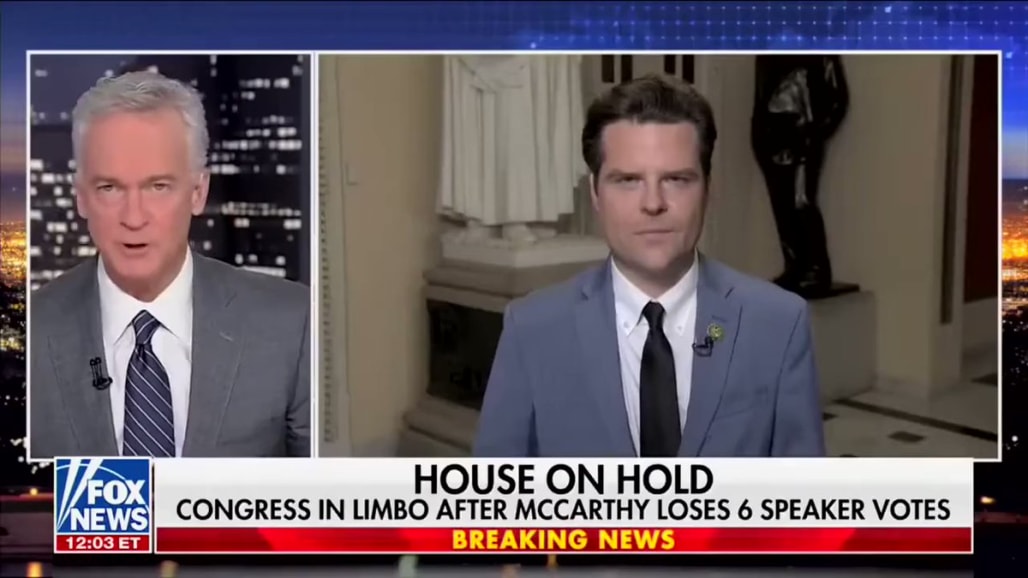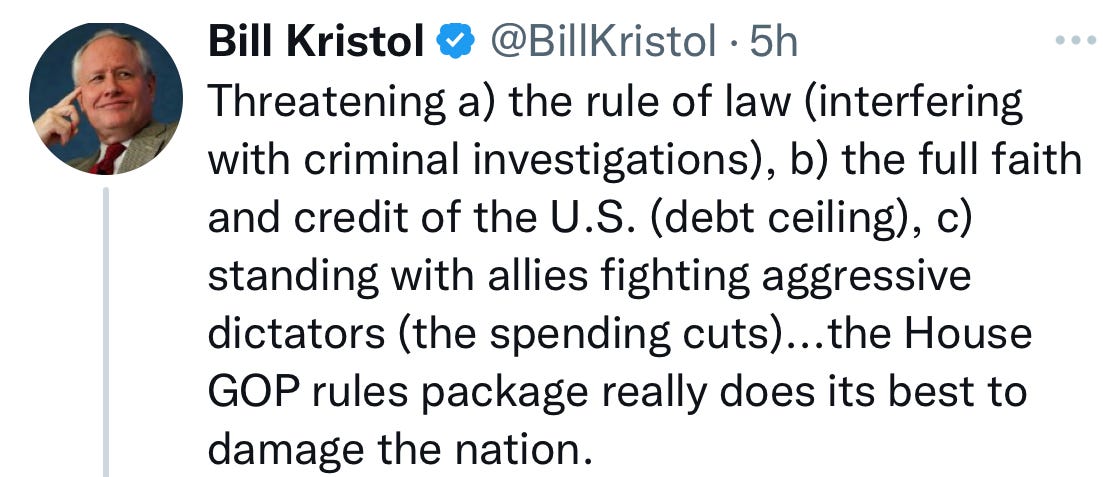Article 1, Section 2 of the Constitution creates a House of Representatives with members who serve two-year terms of office. So every two years, the House ends and must be reconstituted at the beginning of the next Congress. It’s a technicality few of us have considered in past years, but it has big implications in this moment. Now that a speaker has been chosen, it will be time, Monday morning, to adopt the rules of procedure the House will follow for the next two years.
That we are in a very different world at the start of the 118th Congress than we were at the start of the 117th two years ago is underscored by the fact that in 2020, it was Liz Cheney, no longer a member of Congress because of her support for the rule of law, who put Kevin McCarthy’s name in nomination for the Republicans. Among the provisions included in the rules resolution is a resolution, sponsored by Jim Jordan, to seat a “Select Subcommittee to investigate the Weaponization of the Federal Government”—fully resourced and empowered to investigate the investigators.


More on that in “The Week Ahead” edition of the newsletter that will be in your inboxes tomorrow morning. But today, I want to set the table for what we can expect to see in the House tomorrow and in its early days of operation.
First up should be adopting the rules of the House. The last House’s rules don’t carry over, but they don’t start fresh. Typically the new rules are created by adopting the rules of the prior Congress with specific amendments. That’s how it looks like it will work this year. You can find the proposed rules, which are adopted in the form of a resolution, along with proposed legislation for the House to take up in the first week, here. The rules resolution itself runs to 55 pages, but there’s also a shorter side-by-side comparison that clarifies what is being changed. Usually the party that is in power has the votes to pass its rules proposals, and that should be the case here, but given how tight the Republican majority is, we would do well to expect the unexpected this term.
Of course, the marquee rule change is McCarthy’s concession, in exchange for votes from the Matt Gaetz faction, that a single congressperson can act to remove the speaker. In advance of McCarthy’s victory, Gaetz put it this way.

Other pressure points in these new rules are the powers given to the incoming chair of the House Judiciary Committee, Jim Jordan, and a move that would severely hamper the Office of Congressional Ethics. Jen Rubin at the Washington Post has an excellent piece on the ethics angle. Republicans will doubtless be unified behind measures to end funding for Covid mandates, conditions on raising the ceiling for the national debt, and reinstatement of the so-called Holman rule, which allows them to gut funding for specific programs and could be used in an effort to sabotage or defund investigations into or prosecutions of Trump. Greg Sargent has a piece explaining the implications of this change in detail. Fortunately, the House can’t act alone without the Senate, but the flip side of that is that they can prevent action from being taken on key measures, including the budget, unless they sign off.
In addition to a vote on the rules of procedure, the House often adopts resolutions assigning members to committees, although we can expect to see that process continue to be fleshed out over several more weeks. Each party caucus handles its own assignments separately. We’ll learn more about precisely what horses McCarthy had to trade to get the votes he needed as they shape it. But it’s widely rumored that Gaetz’s request to chair a subcommittee on the Armed Services Committee led to his confrontation with Alabama Republican congressman Mike Rogers, who is slated to chair the committee.

Fun fact for those who like a little political trivia, the House includes non-voting members. There is a resident commissioner from Puerto Rico who serves a four-year term, as well as delegates from the District of Columbia and one representative each from the territories of Guam, the U.S. Virgin Islands, the Northern Mariana Islands, and American Samoa. There is a formal proposal to seat a delegate from the Cherokee Nation, but they have not yet been seated. A delegate from the Choctaw Nation is named in a treaty but hasn’t yet been proposed or seated.
Will Democrats have any say in the adoption of the rules? Not much. At the end of debate time for the rules resolution, the majority manager usually moves the previous question. If Republicans vote together as a majority, that will ensure debate is ended, forcing a nearly immediate vote on approval of the rules. So adoption of the “previous question” motion ends debate and prevents the minority from offering its alternative proposal. Although there are other procedural detours the Democrats can try in order to have changes considered, unless enough Republicans defect to their side—an unlikely though not impossible occurrence—the proposed rules will become the rules for the 118th Congress.
We can also expect McCarthy to announce the policies he will implement regarding floor practices during the term of his speakership (however long that may be). These are policies where the speaker has authority or discretion to set practices. They can include matters involving the introduction of bills and resolutions, decorum in debate, and other technical matters. The majority leader may issue a set of written protocols that will determine the scheduling or consideration of legislation for the next two years. We might also see a concurrent resolution with the Senate to hold a joint session of Congress for President Biden’s State of the Union address. Once these matters are accomplished, new Houses may turn to legislative or routine business, which can include the introduction of bills and resolutions. Lots of “interesting” things to look forward to.
The House typically adjourns at the conclusion of this work. The Senate went into recess until late January following its first session. If that’s the case here, the executive branch will enjoy a temporary respite before the deluge of investigative activity the House is about to unleash.
Years ago, a friend who had recently been elected to the House told me it was a lot like high school. They’d held elections for class president and bells rang to tell them when it was time to go somewhere. Let’s hope that after last week’s spectacle, the House can restore decorum and do at least some work on behalf of the American people. But I’m not holding my breath.
Never-Trump Republican Bill Kristol, whose chops include service as chief of staff to Education Secretary William Bennett in the Reagan Administration and chief of staff to Vice President Dan Quayle in the George H. W. Bush administration, as well as teaching politics at the University of Pennsylvania and Harvard University had this assessment of the House’s proposed rules.
We’re in this together,
Joyce
p.s. If you’re enjoying the free version of the newsletter and want to consider supporting my work so I can devote more time to the research and analysis that goes into the newsletter, please consider upgrading to a paid subscription. Either way, I’m glad you’re here!





Joyce you are a treasure... Not holding my breath either, but... we can't ignore the pressure of the reasonable people outside the House. There are a lot of us with common sense and are not ready to kneel in front of short visionned and ill hearted House Representatives.
It is distressing that poorly educated, uninformed bomb throwers want to be, and are elected to office. Their aims have nothing to do with public service or having government operate smoothly for the benefit of citizens. It is dangerous to have people in both Houses whose idea of public service is to stall whatever the Democrats want to do and push the agenda of the crackpot caucus. Where does this crowd think their ideas for governing will end? I’m not sure they’ve thought that far ahead. Heaven help us, because the Matts and Marjories are not in Washington for that purpose. They’re there to blow our House down.